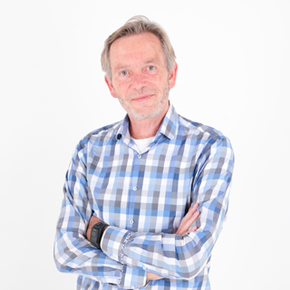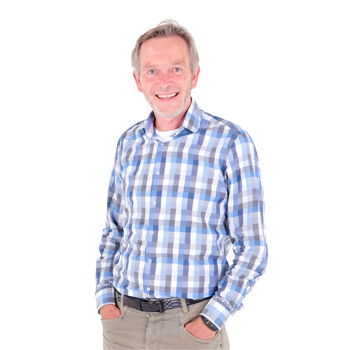NEDU (Nederlandse Energie Data Uitwisseling, or the Dutch Energy Data Exchange) is the platform that connects the Dutch energy sector, including network operators, suppliers and metering companies such as Enexis, Eneco, Tennet, Engie, Essent and BudgetThuis. All these various parties work together on the platform to improve the energy market of which they are a part in whatever ways they can. One such improvement is being able to allocate the costs of the energy network more reliably, both over time and amongst groups of users. This is a challenge because energy flows are becoming less predictable due to the emergence of, for example, solar panels and electric cars. This makes any statistical allocation for a year ahead far from reliable. CQM and NEDU looked into how this allocation can be set up dynamically, so we talked to the person leading on the project for NEDU, Tevfik Prins of BudgetThuis.

Picture: Tevfik Prins of BudgetThuis, responsible within NEDU for the allocation project, in collaboration with CQM.
What exactly did NEDU ask of CQM?
“Individual consumers and small-business clients receive an annual bill from their energy supplier. As well as the actual costs for the previous year, the invoice always contains advanced charges for the coming year, an estimate of the costs that later prove to have been an over- or underestimate, and which needs to be recalculated again later.
“This advanced estimate therefore contains an uncertainty margin that links to the allocation of the network costs. We weren’t satisfied with that allocation, so we put the question to CQM: how can we carry out this allocation more reliably? Though to be honest, the question wasn’t so clearly formulated at first. Initially, we simply told CQM that we wanted 'something' to improve the allocation of customers' energy costs. By asking the right questions and operating flexibly, CQM helped us develop a wonderful sampling methodology – or algorithm – for allocation. One that’s dynamic and provides daily insights, rather than only at year-end. As a result, energy suppliers have a better idea of their costs and can therefore set their customers’ charges more accurately.”
Why is this allocation so important?
“What’s currently stated on the customer’s bill is correct. But at NEDU, we think people will benefit from more specific bills. The way we currently allocate energy costs is crude, with an estimation/uncertainty margin based on an estimate made in advance and without access to real-time insights. This makes it impossible to view or invoice for smaller units of time, so we only ever have one retrospective overview at year-end. And partly due to the advent of new energy sources, such as electric cars and solar panels, this estimate-margin continues to grow. This means there are unnecessary risks in the (un)predictability of energy costs. Risks that can be reduced, so that consumers don’t have to pay as much in advance. Based on CQM’s sample, we believe that margin can be halved, because we’ll then have real-time insights into energy parameters, letting us match our customers’ energy charges as closely as possible with the actual costs. This enables one to make an even more accurate allocation of costs, so that customers only pay for their actual consumption instead of the estimation/uncertainty margin. And this can also be done monthly instead of annually.”
What does this mean for the future?
“Alongside the concrete benefit of lowering that uncertainty margin and thus estimating costs better, this provides a number of other benefits for customers, though it’s not yet clear that whether such benefits are realisable. But it’s precisely the advent of air conditioning, heat pumps, solar panels and other energy sources that makes it useful for consumers and small business clients to know what exactly they’re purchasing their energy for. Especially if you also consider future innovations: why would you always pay the same energy costs for your washing machine, if one week you run two washes and the next week five washes?”

How satisfied are you with the outcome and the collaboration with CQM?
“We’re very happy with the sample that’s been produced. But in particular, we’re extremely pleased with the flexibility CQM has shown throughout this entire process. At first you think you’re dealing with question A, but eventually arrive at something you didn’t initially have in mind. CQM’s helping to clarify the issue, their advisory role in general and then delivering the actual algorithm (sample) that will provide ground-breaking results has made them great people to work with. Their added value also lies in their being able to quickly translate unfamiliar technical content into deep and thorough analyses. They found it relatively easy to turn our bottlenecks into tangible improvements. Which is why I foresee a long collaboration: including in the near future conducting a validity test to see what the sample has thrown up. Because obviously we need to test whether customers actually want this, and whether we can see some nice benefits from lowering the estimation/uncertainty margin.”
What other possibilities do you foresee?
“As I said, we want to be able to further fine-tune the allocation through continuous real-time insights into energy parameters, as in the washing machine example. But that also raises privacy issues. It’s up to the market to convince consumers that checking and using specific parameters will help them reduce costs, both to make energy affordable and to conserve it. Energy costs are increasing year on year in the Netherlands and with this improvement we can significantly reduce those increases. So if we implement this, the whole country will benefit.”
And finally, we asked Jan Telman, the person at CQM responsible for this project, how he looks back on the project?
“It was a challenging project, but it means that with the implementation of the sample, NEDU (and all the various energy suppliers) can provide their clients with greater customisation. Of course, for us as data scientists a project like this is great fun. We’ve been able to analyse a huge amount of data and distil a sample design to achieve an allocation that meets the required reliability. At CQM, we believe in collaborating with the customer as one team in order to achieve the best result. We held weekly meetings with the highly committed members of the NEDU working group. So it wasn’t so surprising that this resulted in finding the right answer to the right question relatively quickly. In the end, every customer question broadens your perspective. A lot needs to happen to ensure we can do our laundry whenever we want and get a bill now and then. The energy sector is continuously working in an innovative and progressive way on the increasingly complex puzzle around the interchange between energy supply and demand. Dynamic allocation of grid use is just one piece in that puzzle.”
Do you want this too?
Please contact Jan Telman. If you want to keep up to date with the latest news from CQM, you can follow us on LinkedIn or sign up for our digital newsletter.
Publication and/or duplication of texts/images is only permitted following explicit permission from CQM.
Photo credits: Pexels, and BudgetThuis.


